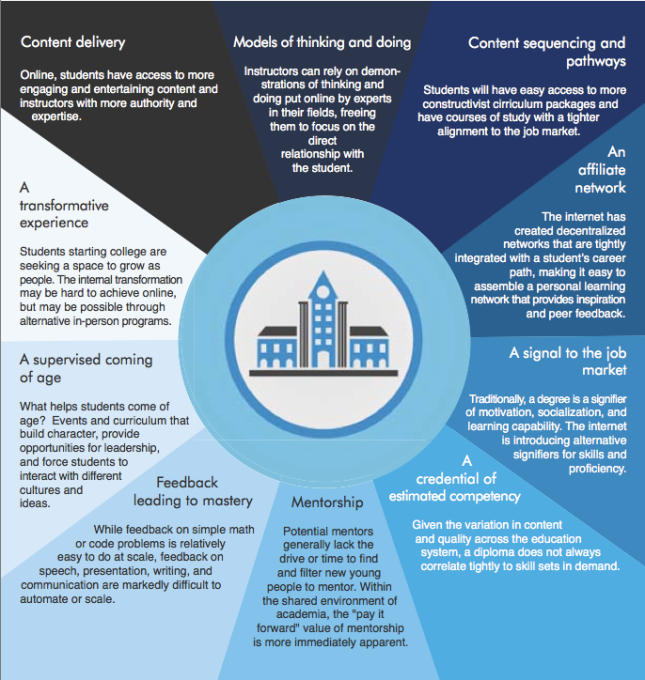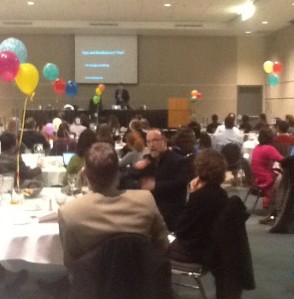In medieval days – university classes consisted of students handwriting out the copies of the text from slowly lectured texts.
The printing press was a huge disruptive technology. University educators with “lecture books” where students still had to copy the same lecture-notes . Not much has changed since then in teaching. The disruptive technology of books didn’t change school. Why do we think computers will?
Why Be Open?
The technical argument:
Education is sharing. Students share with teachers (projects and homework) and teachers share with students (content and ideas). When there is no sharing, there is no education.
Knowledge is magical:
You give knowledge without giving anything away. When items are put in a tangible form, I know longer have it in my possession and have to compete for access…the exception is when ideas are stored digitally. Example: paper newspaper vs CNN.com – users don’t have to compete for the resource when it is digital. We have an unprecendented capacity to share digitally. The cost of sharing one $250 page book from $1000 copied by hand to $.000084 for a digital share. Distribution of digital sharing follows the same pattern.
Sense-making, Meaning-making:
Educationally sharing digital content is about helping users connect with prior knowledge and is “local”. Having the ability to edit or adapt material to help with the sense-making is vital and necessary. Copyright prohibits this despite the Internet’s ability to help it. Creative Commons, on the other hand, enforces sharing. What the Internet enables – OER allows.
Buy One, Get One:
You don’t always get one when you buy one – for instance, the public investment in research at universities. $2750 per article with all costs included – yet the public doesn’t have free access to these peer-reviewed articles. All taxpayer-funded educational resources SHOULD be OER.
Financial Argument:
Wiley debunks the theory that if you give it away for free, people stop buying. Shows examples of students registering for courses after using OER, correlations between free online book sales with strong print sales, and for-profit business being successful using CC licensed textbooks (Flat World Knowledge).
Flat World Knowledge model – use online for free or pay approximately $35 for a print-on-demand text. Students have saved approximately $39 million.
Project Kaleidoscope – 10 high enrolled courses on 8 campuses – sharing adopted OER texts targeted at specific courses. 97% students rate the text about the same or better.%83 like the format as well or better than traditional texts. 87% would choose or have no preference on their next courses based on the availability of these types of texts.
CK12 – teachers adapt CK12 materials for K-12 in a printed version. The model shows how high schools can pay $5 instead of $80 for textbooks. Expensive books are slow to turn over – content becomes dated over the 7 year adoption cycle. The $5 model allows students to consume the text, and interact with it, because the schools will revise and reprint the next year. There has been no significant difference using these texts without providing professional development in using this technology – (the cost reduction is significant though!).
Utah takes the lead – Statewide secondary schools will be using open texts starting in 2012.
Openness facilitates the Unexpected
Examples:
Syllabi in a wiki. Students can change it if they want. No one touched the wiki (even with permission) at first. Later, they added assignments – things they wanted to see.
Student work archived on blogs (making optional avoids FERPA). This work becomes searchable artifacts for others outside the course. These pieces get connected to the greater web for comment, sharing, and motivate students to up their game. The work becomes part of the student’s online identity and so they take the time for more quality work.
Open the course online for non-registered students to participate. 75 people participated with 7 graduate students. The global audience made it richer. The partipants got a certificate from David with a “good job” on it. See Chronicle article.
Use of badges for grades on courses created using a MORP type format.
Openness:
Easier to use data to fix courses. There is a relationship between openness and analytics. Requires permissions to be able to make those fixes.
Speed of Innovation:
Content IS the infrastructure. ‘The physical components of interrelated systems…essential to enable, sustain, or enhance’ societies and enterprises. – wikipedia. To speed up innovation, increase quality and decrease the cost of the infrastructure. Lower cost and higher quality decreases the risk of innovation.
Do the Right Thing – the moral argument:
If we can push a button that betters the world, wouldn’t you? Shouldn’t you? Putting materials online with open license is “pusing the easy button” for educational sharing. What is the responsibilities inherent with that. What kind of obligation do we have to push that button since we have the ability to do it?
“The good we can do is constrained only our creativity and commitment.”
http://davidwiley.org/








